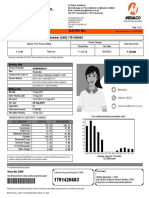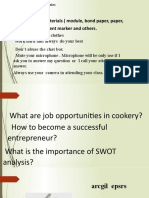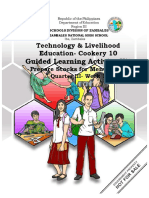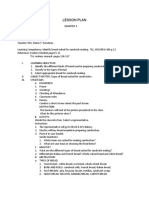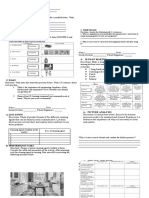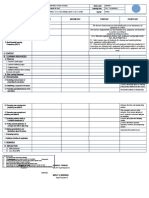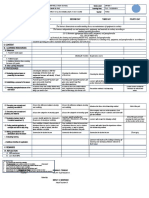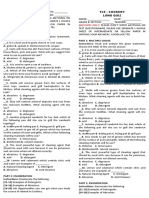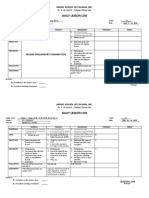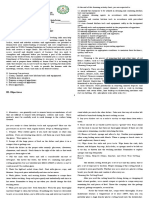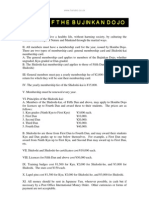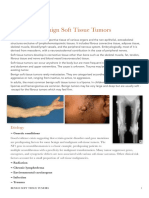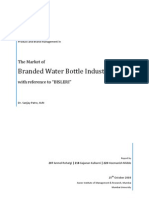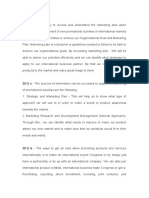100%(1)100% found this document useful (1 vote)
46 viewsKitchen Tools
Kitchen Tools
Uploaded by
RHONELYN HAROThe document discusses kitchen tools and paraphernalia. It begins by stating the content and performance standards which demonstrate an understanding of using and maintaining cookery equipment. It then lists the most essential learning competencies which is to utilize appropriate kitchen tools, equipment, and paraphernalia. Several types of kitchen tools are then defined, including their common materials like aluminum, stainless steel, plastic, and their various uses like basters, cans/bottles openers, colanders, cutting boards, knives, measuring cups/spoons, peelers, whisks and more. The document provides information on identifying, discussing and appreciating the different types of tools found in the kitchen.
Copyright:
© All Rights Reserved
Available Formats
Download as PPTX, PDF, TXT or read online from Scribd
Kitchen Tools
Kitchen Tools
Uploaded by
RHONELYN HARO100%(1)100% found this document useful (1 vote)
46 views25 pagesThe document discusses kitchen tools and paraphernalia. It begins by stating the content and performance standards which demonstrate an understanding of using and maintaining cookery equipment. It then lists the most essential learning competencies which is to utilize appropriate kitchen tools, equipment, and paraphernalia. Several types of kitchen tools are then defined, including their common materials like aluminum, stainless steel, plastic, and their various uses like basters, cans/bottles openers, colanders, cutting boards, knives, measuring cups/spoons, peelers, whisks and more. The document provides information on identifying, discussing and appreciating the different types of tools found in the kitchen.
Original Description:
ppt
Copyright
© © All Rights Reserved
Available Formats
PPTX, PDF, TXT or read online from Scribd
Share this document
Did you find this document useful?
Is this content inappropriate?
The document discusses kitchen tools and paraphernalia. It begins by stating the content and performance standards which demonstrate an understanding of using and maintaining cookery equipment. It then lists the most essential learning competencies which is to utilize appropriate kitchen tools, equipment, and paraphernalia. Several types of kitchen tools are then defined, including their common materials like aluminum, stainless steel, plastic, and their various uses like basters, cans/bottles openers, colanders, cutting boards, knives, measuring cups/spoons, peelers, whisks and more. The document provides information on identifying, discussing and appreciating the different types of tools found in the kitchen.
Copyright:
© All Rights Reserved
Available Formats
Download as PPTX, PDF, TXT or read online from Scribd
Download as pptx, pdf, or txt
100%(1)100% found this document useful (1 vote)
46 views25 pagesKitchen Tools
Kitchen Tools
Uploaded by
RHONELYN HAROThe document discusses kitchen tools and paraphernalia. It begins by stating the content and performance standards which demonstrate an understanding of using and maintaining cookery equipment. It then lists the most essential learning competencies which is to utilize appropriate kitchen tools, equipment, and paraphernalia. Several types of kitchen tools are then defined, including their common materials like aluminum, stainless steel, plastic, and their various uses like basters, cans/bottles openers, colanders, cutting boards, knives, measuring cups/spoons, peelers, whisks and more. The document provides information on identifying, discussing and appreciating the different types of tools found in the kitchen.
Copyright:
© All Rights Reserved
Available Formats
Download as PPTX, PDF, TXT or read online from Scribd
Download as pptx, pdf, or txt
You are on page 1of 25
CONTENT STANDARD
The learners demonstrate an understanding the use and maintenance of equipment in
cookery.
PERFORMANCE STANDARD
The learners independently use and maintain tools, equipment, and materials in
cookery according to standard operating procedures
MOST ESSENTIAL LEARNING COMPETENCIES
LO 1. Utilize appropriate kitchen tools, equipment, and paraphernalia
1.1 identify types of tools and paraphernalia
TLE_HECK7/8UT- 0a-1
Value Focus: Safety at Workplace & Cooperation
TODAY’S OBJECTIVES…..
Identify types of kitchen tools and paraphernalia.
Discuss types of kitchen tools and paraphernalia.
Show Appreciation in knowing the types of
kitchen tools and paraphernalia
.
ACTIVITY (10 minutes)
Group I – KITCHEN TOUR!
Visit the small kitchen inside the classroom, look for the
available kitchen tools. Described its functions/usage in the
kitchen.
Group II – MATCH ME!
Match the given pictures of kitchen tools with its function. Post
it on the board.
Reminders: While doing the Activity
Make sure to observe proper health protocols
Wear facemask properly
Observe social distancing
ANALYSIS
How do you find our activity?
Do you find it interesting?
What part of the activity do you find
interesting?
ABSTRACTION
Types of kitchen tools
and paraphernalias
DIFFERENT MATERIALS OF KITCHEN TOOLS
We have many tools and equipment used in the kitchen. All of these are made up of
different materials, each having certain advantages and disadvantages. The following lists
are materials of kitchen utensils and commonly found in the kitchen.
ALUMINUM is the most
popular, lightweight,
attractive, and less STAINLESS STEEL is
expensive material thus also one of the most
considered best for all popular materials used
around for tools and equipment
use. but is more expensive.
However, it is easier to
A GLASS is breakable, clean and shine and will
and so great care is not wear out as soon as
needed to ensure aluminum.
extended shelf life.
TEFLON is applied as a PLASTIC AND HARD
special coating to the RUBBER is used for
inside of some aluminum cutting and chopping
or steel pots and pans. It boards, tabletops, bowls,
is easier to wash and trays, garbage pails, and
clean; however, take care canisters. Plastics are
not to scratch the Teflon remarkably durable and
coating with a sharp cheap but may not last
instrument. Also, it helps long.
food from not sticking to
the pan.
A baster is handy for returning some of the meat or
poultry juices from the pan, back to the food. Basting
brushes can be used for the same purpose, but they
are also convenient for buttering the tops of breads
and baked goods after they come out of the oven.
Cans, bottles, cartoons opener use to open a food tin,
preferably with a smooth operation, and comfortable grip
and turning knob.
Colanders also called a vegetable strainer are essential
for various tasks from cleaning vegetables to straining
pasta or tin contents.
Cutting Boards a wooden or plastic
board where meats and vegetables
can be cut.
Dredgers – used to shake flour, salt, and pepper on meat,
poultry, and fish.
Double boiler – used when temperatures must be kept below
boiling, such as for egg sauces, puddings, and to keep foods
warm without overcooking.
Emery boards/sharpening steel – used to sharpen long
knives.
Flipper use for turning hamburgers and other food items
Funnels – used to fill jars, made of various sizes of
stainless steel, aluminum, or of plastic
Garlic Press is a kitchen tool which is specifically
designed for the purpose of pulping garlic for cooking
Graters used to grate, shred, slice and separate foods
such as carrots, cabbage and cheese.
Handy Poultry & Roasting Tools make it easier to lift a hot
roasted turkey from the roaster to the serving platter,
without it falling apart.
Kitchen Knives often referred to as cook's or chef's
tools, knives are a must for all types of kitchen tasks, from
peeling an onion and slicing carrots, to carving a roast or
turkey
Kitchen Shears They are practical for opening food
packages, cutting tape or string to package foods or
simply to remove labels or tags from items. Other cutting
tools such as box cutters are just as handy, especially for
opening packages.
Measuring Cups, Spoons Measuring tools are among
the most important items found in any kitchen, since
consistently good cooking depends upon accurate
measurements. Measuring tools should be standardized.
Measuring cups and spoons are also in the home kitchen.
Scales are used to weigh materials of bigger volumes.
These are delicate and precision instruments that must be
handled carefully and are more dependable in terms of
accuracy.
16. Pasta Spoon or Server is use to transfer a little or much
cooked pasta to a waiting plate, without mess. Pasta spoons are
best used with spaghetti-style or other long pasta noodles; you
can use a large slotted serving spoon for short pastas.
Potato Masher used for mashing cooked potatoes,
turnips, carrots or other soft cooked vegetables.
Rotary eggbeater – used for beating small amount of eggs
or batter. The beaters should be made up of stainless steel,
and gear driven for ease in rotating
Scraper- a rubber or silicone tools to blend or scrape the
food from the bowl; metal, silicone or plastic egg turners
or flippers
Seafood Serving Tools make the task of cleaning
seafood and removing the shell much easier. For cooking
seafood, utensils will vary depending on
Serving spoons- a utensil consisting of a small, shallow
bowl on a handle, used in preparing, serving, or eating
food.
Serving Tongs enables you to more easily grab and
transfer larger food items, poultry or meat portions to a
serving platter, to a hot skillet or deep fryer, or to a plate.
It gives you a better grip and the longer the tongs, the
better especially when used with a deep fryer, a large
stock pot or at the barbecue.
Soup Ladle is used for serving soup or stews, but can
also be used for gravy, dessert sauces or other foods. A
soup ladle also works well to remove or skim off fat from
soups and stews.
24. Spoons – solid, slotted, or perforated. Made of
stainless steel or plastic, the solid ones
are used to spoon liquids over foods and to lift foods,
including the liquid out of the pot
25. Temperature Scales - used to measure heat
intensity. Different thermometers are used for different
purposes in food preparation – for meat, candy or deep-fat
frying. Other small thermometers are hanged or stand in
ovens or refrigerators to check the accuracy of the
equipment’s thermostat.
26. Two-tine fork – used to hold meats while slicing, and to
turn solid pieces of meat while
browning or cooking Made of stainless steel and with
heat-proof handle.
27. Vegetable peeler. used to scrape vegetables, such as
carrots and potatoes and to peel fruits. The best ones are
made of stainless steel with sharp double blade that
swivels.
28. Whisks for Blending, Mixing used for whipping eggs
or batter, and for blending gravies, sauces, and soups.
The beaters are made of looped steel piano wires which
are twisted together to form the handle
29. Wooden spoons continue to be kitchen essentials
because of their usefulness for used for creaming,
stirring, and mixing. They should be made of hard wood
GENERALIZATIO
N many Kitchen tools are mentioned in our discussion?
How
What are they?
How can you apply your
knowledge in using these different
types of Kitchen tools in your kitchen activities?
APPLICATION
Choose at least two Kitchen tools in the table and tell how
useful it is in our Kitchen activities?
How can you relate your knowledge in using Kitchen tools to
other subjects.
ASSESSMEN
T
Identification (1-5)
Directions: Identify what is asked in the following statements.
1. A must for all types of kitchen tasks, from peeling an onion and slicing carrots, to carving a
roast or turkey often referred to as cook's or chef's tools.
2. A kitchen tool which is specifically designed for pulping garlic for cooking.
3. A tool used for beating small amount of eggs or batter, it is made up of stainless steel and
gear driven for ease in rotating.
4. It is the most popular, lightweight, attractive and less expensive tool, it requires care to keep
it shiny and clean.
5. A kind of utensil used to measure solids and dry ingredients such as flour, sugar and fat.
Essay: (5 points)
Discuss in not less than 2 sentences why it is necessary to know the proper usage of each
Kitchen Tools and paraphernalia’s.
ESSAY RUBRIC
Score Criteria
Express the ideas very clear, concise, and well organized
5 with excellent sentence/paragraph construction
Express the ideas mostly clear, concise, and well
4 organized with good sentence/paragraph construction
Ideas are unclear and/or disorganized and not expressed in
3 a logical manner
Ideas/concepts are unclear, disorganized, ramble and make
2 little sentence
1 Failed to express ideas
AGREEMENT
Research on the classification of kitchen tools and
paraphernalia’s.
RHONELYN V. HARO
You might also like
- Summary For Customer Account Number (CAN) 1791426683Document2 pagesSummary For Customer Account Number (CAN) 1791426683ARNEL RUALLONo ratings yet
- Acura TL 2012 Repair ManualDocument6,257 pagesAcura TL 2012 Repair ManualJosif Morar100% (3)
- David Rudel - The Moment of Zuke - Critical Positions and Pivotal Decisions For Colle System Players (2009, Thinker Press) PDFDocument246 pagesDavid Rudel - The Moment of Zuke - Critical Positions and Pivotal Decisions For Colle System Players (2009, Thinker Press) PDFIssam Kalil100% (5)
- Utilize-Appropriate-Kitchen-Tools-Utensils-and-Equipment (1) (Autosaved)Document46 pagesUtilize-Appropriate-Kitchen-Tools-Utensils-and-Equipment (1) (Autosaved)zeny bulongNo ratings yet
- Schools Division Office I PangasinanDocument2 pagesSchools Division Office I PangasinanJessel Mejia OnzaNo ratings yet
- GRADES 1-12 Daily Lesson LOG School Grade Level Teacher Learning Area Teaching Dates and Time QuarterDocument4 pagesGRADES 1-12 Daily Lesson LOG School Grade Level Teacher Learning Area Teaching Dates and Time QuarterJan Alleana FernandezNo ratings yet
- TLE 10 DLL Week 4Document5 pagesTLE 10 DLL Week 4feb dadangNo ratings yet
- DLL in Cookery Week 1&2Document12 pagesDLL in Cookery Week 1&2Roxanne Jessa CatibogNo ratings yet
- Technology and Livelihood Education - 10Document12 pagesTechnology and Livelihood Education - 10RonnelMananganCorpuzNo ratings yet
- Glak Tle-Cookery-10 Q-3 WK 1Document12 pagesGlak Tle-Cookery-10 Q-3 WK 1adadNo ratings yet
- Store and Stack Kitchen Tools and EquipmentDocument24 pagesStore and Stack Kitchen Tools and EquipmentRochel MarinNo ratings yet
- Aacivity Sheets 9Document71 pagesAacivity Sheets 9Joyce Anne De Vera RamosNo ratings yet
- Cot 1 LESSON PLAN in Tle 9 Cookery 22 23Document3 pagesCot 1 LESSON PLAN in Tle 9 Cookery 22 23KingFeb TVNo ratings yet
- Cookery Tle 9 - DLL Wadz 2019 - Week 10Document2 pagesCookery Tle 9 - DLL Wadz 2019 - Week 10Edward YagoNo ratings yet
- Cookery Activity SheetsDocument2 pagesCookery Activity Sheetsyram julianoNo ratings yet
- Diagnostic TestDocument1 pageDiagnostic TestMary Jill Sumiguin Caber100% (1)
- DLL Tle 7 Cookery Q3W5Document2 pagesDLL Tle 7 Cookery Q3W5romar ipacNo ratings yet
- DLL Tle 7 Cookery Q3W4Document2 pagesDLL Tle 7 Cookery Q3W4romar ipacNo ratings yet
- Second Quarter Technology and Livelihood Education Vi Written Work (Answer Sheet)Document4 pagesSecond Quarter Technology and Livelihood Education Vi Written Work (Answer Sheet)james mabantaNo ratings yet
- Cookery 4Document3 pagesCookery 4DM RielNo ratings yet
- DLL g9 Q3W1Document4 pagesDLL g9 Q3W1JERLYNNo ratings yet
- Learner'S Packet No. 1: Quarter 1Document12 pagesLearner'S Packet No. 1: Quarter 1Salgie Masculino100% (1)
- DLL Tle 7 Cookery Q3W3Document2 pagesDLL Tle 7 Cookery Q3W3romar ipac100% (1)
- Posttest (Fish/Food Processing 8 Q3, Week 1-2)Document2 pagesPosttest (Fish/Food Processing 8 Q3, Week 1-2)Jon GraniadaNo ratings yet
- Long QuizDocument3 pagesLong QuizJaz TagalagNo ratings yet
- Sandwiches 1Document34 pagesSandwiches 1Chuchu100% (1)
- Weekly Home Learning Plan Grade 9 Quarter 1 (Week 2) S.Y.:2020-2021 Date Week Learning Competency Learning Task Mode of Delivery Week 2Document2 pagesWeekly Home Learning Plan Grade 9 Quarter 1 (Week 2) S.Y.:2020-2021 Date Week Learning Competency Learning Task Mode of Delivery Week 2JomajFalcatanDelaCruz100% (1)
- Learning Modules - Cookery 9Document81 pagesLearning Modules - Cookery 9Glee LeeNo ratings yet
- Read and Interpret Kitchen PlanDocument9 pagesRead and Interpret Kitchen PlanCharles Vincent PaniamoganNo ratings yet
- DLL 1st-QRT Appetizer LO3Document3 pagesDLL 1st-QRT Appetizer LO3Rachelle Mae EgunaNo ratings yet
- Student's Learning Activity in COOKERY 9Document4 pagesStudent's Learning Activity in COOKERY 9KC Tolentino CahanapNo ratings yet
- First Quarter - Test Cookery 9Document5 pagesFirst Quarter - Test Cookery 9SherylReyesFulgencio100% (2)
- TLE Cookery 9Document5 pagesTLE Cookery 9DANNA LOU CERLOSNo ratings yet
- TVL Cookery9 11week3-4Document23 pagesTVL Cookery9 11week3-4Marie-Cris QuintoNo ratings yet
- TLE 9 Cookery Intervention 4th Quarter2019 2020Document2 pagesTLE 9 Cookery Intervention 4th Quarter2019 2020Marilyn Garcia100% (2)
- Cleaning and Sanitizing Cookery 8Document5 pagesCleaning and Sanitizing Cookery 8Eve MejosNo ratings yet
- DLL TLE Cookery Grade10 Quarter1 Week4Document4 pagesDLL TLE Cookery Grade10 Quarter1 Week4Digna RamosNo ratings yet
- Technology and Livelihood Education (TLE) : Home Economics-Cookery Quarter 1 - Week 3 and 4Document20 pagesTechnology and Livelihood Education (TLE) : Home Economics-Cookery Quarter 1 - Week 3 and 4jimamodiaNo ratings yet
- DLL in Tle 10Document6 pagesDLL in Tle 10Margie ZuluetaNo ratings yet
- Cookery 10 Q2 Lo1 - W1Document5 pagesCookery 10 Q2 Lo1 - W1Mildred Lizano Tale-TuscanoNo ratings yet
- DLL G9 Q2W4Document4 pagesDLL G9 Q2W4JERLYNNo ratings yet
- Recto Memorial National High School: Dito Na Isusulat Ang SagotDocument8 pagesRecto Memorial National High School: Dito Na Isusulat Ang SagotRaymund Capatoy100% (1)
- DLL Cookey 9 July 30-August 3, 2018Document3 pagesDLL Cookey 9 July 30-August 3, 2018Grace Beninsig DuldulaoNo ratings yet
- Quarter 1 Lesson 1Document25 pagesQuarter 1 Lesson 1Juviline BanalNo ratings yet
- Mise in PlaceDocument3 pagesMise in PlaceCharin SobronNo ratings yet
- First Periodical Examination in Tle 10 (Cookery) : San Juan National High School-San Antonio AnnexDocument4 pagesFirst Periodical Examination in Tle 10 (Cookery) : San Juan National High School-San Antonio AnnexMichelle Copones Llanes100% (1)
- TLE-Cookery 9 - WK1-8 - 1st - QuarterDocument12 pagesTLE-Cookery 9 - WK1-8 - 1st - QuarteradadNo ratings yet
- DLP CookingDocument4 pagesDLP CookingIvy AventunaNo ratings yet
- Prepare Poultry For CookingDocument60 pagesPrepare Poultry For CookingTine FranciscoNo ratings yet
- Technology and Livelihood Education Cookery 10 Quarter 1-LASDocument21 pagesTechnology and Livelihood Education Cookery 10 Quarter 1-LASKeith Justine Ababao100% (2)
- Nov 7-11Document5 pagesNov 7-11NORMILET EVANGELISTANo ratings yet
- Lesson Plan in Tle CookeryDocument8 pagesLesson Plan in Tle CookeryMelody Dacquel-GahidNo ratings yet
- Cookery 10-Diagnostic TestDocument4 pagesCookery 10-Diagnostic TestMarvin Dela Cruz100% (1)
- Republic of The Philippines Department of Education Esperanza National High School Koronadal City Division Semi-Detailed Lesson Plan in Cookery NciiDocument8 pagesRepublic of The Philippines Department of Education Esperanza National High School Koronadal City Division Semi-Detailed Lesson Plan in Cookery NciidarlenecabridoNo ratings yet
- 10 Sils : How Do We Sanitize Tools?Document7 pages10 Sils : How Do We Sanitize Tools?Jeryll Mutia SimangcaNo ratings yet
- Grade 10 TLE FIRST GRADINGDocument5 pagesGrade 10 TLE FIRST GRADINGMargiebel DaanoNo ratings yet
- The Teaching of TleDocument17 pagesThe Teaching of TleJurislyNo ratings yet
- Intervention in TLE Quarter 1Document3 pagesIntervention in TLE Quarter 1fgraceNo ratings yet
- Lesson Plan in CookeryDocument2 pagesLesson Plan in CookeryAnjanette SandiganNo ratings yet
- G8 Cookery 1Document5 pagesG8 Cookery 1Joemari VistavillaNo ratings yet
- Cookery 9 Quarter 3 Las Number 4Document3 pagesCookery 9 Quarter 3 Las Number 4Toni Lopez100% (1)
- COOKERY 10 Quarter 2 LAS No. 9Document4 pagesCOOKERY 10 Quarter 2 LAS No. 9Pauleen Alexa GarciaNo ratings yet
- Topic 5-Cooking Tools in Aid of NutritionDocument14 pagesTopic 5-Cooking Tools in Aid of NutritionMARY GRACE CABILINo ratings yet
- Bujinkan RulesDocument2 pagesBujinkan Ruleskalo92No ratings yet
- PPT-Q A For Steel and ConcreteDocument146 pagesPPT-Q A For Steel and ConcreteDr.SRINIVAS RAO PASUPULETI50% (2)
- Pre Seen Application Note DemoDocument61 pagesPre Seen Application Note DemoMohamed AliNo ratings yet
- 3 - 4 - 5th ProgramDocument3 pages3 - 4 - 5th Programambika400No ratings yet
- Sheet 3 - Solution - EE218Document4 pagesSheet 3 - Solution - EE218NouraNo ratings yet
- Apple Cider VinegarDocument3 pagesApple Cider Vinegar1776No ratings yet
- Dividend Reinvestment Plan: Reinvestment Plan and A Unit Purchase Plan Which Operate Principally The Same As Other PlansDocument3 pagesDividend Reinvestment Plan: Reinvestment Plan and A Unit Purchase Plan Which Operate Principally The Same As Other PlansAndrew CharlesNo ratings yet
- Optical Communications (OC)Document22 pagesOptical Communications (OC)Bharat ChilamkuriNo ratings yet
- STC TRS Conventional 02Document419 pagesSTC TRS Conventional 02battery sectionNo ratings yet
- A Brief List of Marketing Gurus and Their WorksDocument8 pagesA Brief List of Marketing Gurus and Their WorksAHMET NURI KUCUKOSMANOGLUNo ratings yet
- Insomnia Type QuestionnaireDocument61 pagesInsomnia Type QuestionnaireMondlTNo ratings yet
- Best Home Appliances Company in Cuttack OdishaDocument20 pagesBest Home Appliances Company in Cuttack Odishaalok jyotiNo ratings yet
- AcCOMPLISMENT REPOT-In-SBFP-2023-2024Document2 pagesAcCOMPLISMENT REPOT-In-SBFP-2023-2024CHERIE ANN APRIL SULITNo ratings yet
- 04-Principles That Guide PracticeDocument18 pages04-Principles That Guide PracticeKrisandy WinandarNo ratings yet
- Firealarm PDFDocument52 pagesFirealarm PDFგიორგი მოდებაძეNo ratings yet
- Marketing Plan DraftDocument18 pagesMarketing Plan DraftTreachy Rose GeneblazaNo ratings yet
- Artigo Granito e MármoreDocument11 pagesArtigo Granito e Mármoremagobiologia7350No ratings yet
- Colpal2019 AR - LORES - PDFDocument148 pagesColpal2019 AR - LORES - PDFAkshay AithalNo ratings yet
- Amphenol Bxa 80063 4cf Edin XDocument2 pagesAmphenol Bxa 80063 4cf Edin XJonas AldaoNo ratings yet
- C++ How To Program Early Objects Version 9th Edition Deitel Solutions Manual DownloadDocument12 pagesC++ How To Program Early Objects Version 9th Edition Deitel Solutions Manual DownloadCatherine Simmons100% (23)
- Microscope Buyers ChecklistDocument5 pagesMicroscope Buyers ChecklistTerence MichaelNo ratings yet
- ZAA424631821 - Indesore Sweater LTD - Periodic - SMETA 4 Pillars - 26 Jul 23 - ReportDocument85 pagesZAA424631821 - Indesore Sweater LTD - Periodic - SMETA 4 Pillars - 26 Jul 23 - Reportmd.kajalbdNo ratings yet
- Cagri Karaciklar Benign Soft Tissue TumorsDocument5 pagesCagri Karaciklar Benign Soft Tissue TumorsÇağrıNo ratings yet
- Branded Water Bottle IndustryDocument32 pagesBranded Water Bottle IndustryHeemanish Midde100% (1)
- Topic 1 Q1.1 It Is Necessary To Access and Understand The Marketing Plan WhenDocument10 pagesTopic 1 Q1.1 It Is Necessary To Access and Understand The Marketing Plan WhenPatrick GarciaNo ratings yet
- Ballooning EffectDocument11 pagesBallooning EffectHamdi SaidNo ratings yet
- Fishing Thesis StatementDocument7 pagesFishing Thesis Statementtmexyhikd100% (2)
